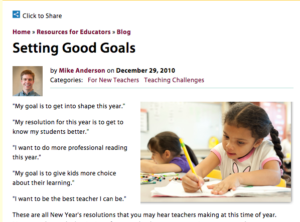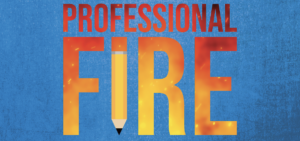Setting Good Goals
Original Article: https://www.responsiveclassroom.org/blog/setting-good-goals
 “My goal is to get into shape this year.”
“My goal is to get into shape this year.”
“My resolution for this year is to get to know my students better.”
“I want to do more professional reading this year.”
“My goal is to give kids more choice about their learning.”
“I want to be the best teacher I can be.”
These are all New Year’s resolutions that you may hear teachers making at this time of year. Many people use the beginning of a new calendar year to name improvements they want to make in their lives, and teachers are no different. This is a natural time to reflect on what’s working and what could be going better.
But when I talk with teachers about settings goals for themselves, I’ve often found that it’s a struggle for them to set goals that are actually attainable. Look again at the goals listed above. What strikes me about all of them is that they’re kind of fuzzy and mushy. What does it mean to “get into shape” How much choice is “more choice”? What does it mean to be “the best teacher I can be”? How would you ever measure these things? How would you know when you’d accomplished these goals?
Here are some tips for setting clear and attainable goals this year:
- Create Action-Oriented Goals
Instead of saying you want to “get into shape,” think about goals you could set that will help get you there. For instance: “My goal is to exercise for 20 minutes, 5 days a week.” Or, “I’m going to replace my after-work candy bar with an after-work apple.” - Create Measurable Goals
How will you know if/when you’re making progress on a goal such as “I want to know my students better”? How will you know when you’ve succeeded? “I will put down teacher work when my students enter the classroom in the morning so I can chat with them,” is a measurable goal. Another might be, “I will have lunch with my students one day a week.” You could make a chart and track your progress in both of these cases—you could measure your success. - Make Sure Goals Are Meaningful
Why do you want to do more professional reading? Try reflecting on what’s behind a general goal like this. Are you feeling disconnected from the education field in general? Is there a particular topic you’re really interested in exploring? Are you feeling out of the loop because your colleagues are discussing books you don’t know? Choose a goal that answers your particular need: “I will read at least three educational blogs a week.” “I will read at least three books about Academic Choice by the end of March.” “I’ll start a book club at school.”
These ideas are drawn from Chapter 5 of my book, The Well-Balanced Teacher. In that chapter, I discuss setting good goals in more detail, and I offer a structure for setting, measuring, and assessing goals. If you want to dig deeper into this topic, I hope you’ll check it out. In the meantime, what are your goals for the New Year?




